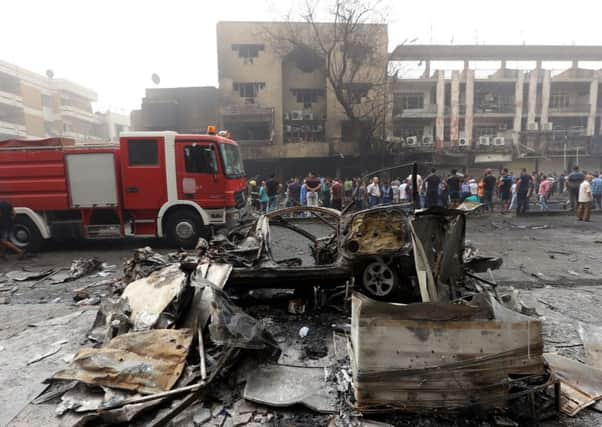At least 115 killed in IS bombings in Baghdad


The attack, claimed by Islamic State, was the deadliest in months in the Iraqi capital, and came despite a series of recent gains against the extremists, including the capture of Fallujah.
The attack took place in the central Karada district of Baghdad, where a suicide bomber blew up an explosives-laded pick-up truck outside a crowded shopping centre, killing at least 115 people and wounding up to 200 others, according to a police officer. He said the dead included 15 children, ten women and six policemen.
Advertisement
Hide AdAdvertisement
Hide AdThe suicide bomber struck shortly after midnight, when families and young people were out on the streets after breaking their Ramadan fast. Most of the victims were inside a multi-storey shopping and amusement centre, where dozens burned to death or suffocated, officials said.
“It was like an earthquake,” said Karim Sami, 35, a street vendor. “I wrapped up my goods and was heading home when I saw a fireball with a thunderous bombing.
“I was so scared to go back and started to make phone calls to my friends, but none answered.” The father of three added that one of his friends had been killed, another was wounded and one was still missing.
Within hours, IS claimed responsibility for the bombing in a statement posted online, saying they had deliberately targeted Shiite Muslims.
At the scene, firefighters and civilians were seen carrying the dead away, their bodies wrapped in blankets and sheets. Smoke billowed from the shopping centre, which was surrounded by the twisted and burned wreckage of cars and market stalls.
Meanwhile, an improvised explosive device went off in Baghdad’s northern Shaab area, killing five people and wounding 16, another police officer said.
No group claimed responsibility for the attack, but it bore the hallmarks of IS militants who often target commercial districts and Shiite areas.
It is the second most deadly attack in the capital this year. On 11 May, IS militants carried out three car bombings in Baghdad, killing 93 people.
Advertisement
Hide AdAdvertisement
Hide AdHours after the attacks, Iraqi prime minister Haider al-Abadi and politicians visited the site in Karada.
Video footage uploaded to social media showed an angry crowd, with people calling Mr al-Abadi a “thief” and shouting at his convoy. Eyewitness said the crowd pelted Mr al-Abadi’s car with rocks, shoes and jerry cans.
Until the government launched its Fallujah operation, the prime minister had faced growing social unrest and anti-government protests sparked, in part, by popular anger at the lack of security in the capital. In one month, Baghdad’s highly-fortified Green Zone – which houses government buildings and diplomatic missions – was stormed twice by anti-government protesters.
In Karada, civilians expressed their frustration at the government’s failure to secure the capital.
“We are in a state of war, and these places are targeted. The security can’t focus on the war [against IS] and forget Baghdad,” Mr Sami said.
The UN envoy for Iraq, Jan Kubis, described the Karada attack as “a cowardly and heinous act of unparalleled proportions” and urged the Iraqi government to redouble its security efforts to protect Iraqis during celebrations for the Eid al-Fitr holiday, which marks the end of Ramadan.
IS militants who have suffered “defeats at the battlefront are seeking to avenge their losses by targeting vulnerable civilians,” Mr Kubis added.